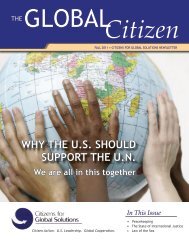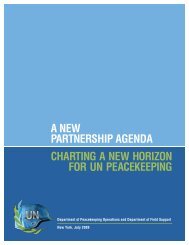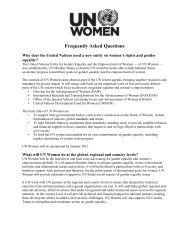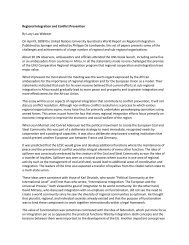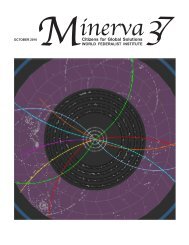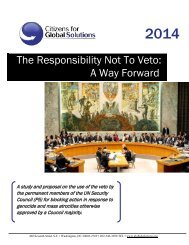Minerva, Spring 2008 (Volume 32) - Citizens for Global Solutions
Minerva, Spring 2008 (Volume 32) - Citizens for Global Solutions
Minerva, Spring 2008 (Volume 32) - Citizens for Global Solutions
You also want an ePaper? Increase the reach of your titles
YUMPU automatically turns print PDFs into web optimized ePapers that Google loves.
an institution, and at the same time shield<br />
it and cocoon it. If you want to re<strong>for</strong>m an<br />
institution, it is better to create a sense of<br />
crisis around it. We should not fear another<br />
showdown at the Security Council.<br />
We should look <strong>for</strong>ward to it. Instead,<br />
whenever the UN is seriously challenged<br />
by nationalists, we run to the rescue. The<br />
antagonists of the UN have been very assertive,<br />
and they have scared us, but they<br />
are a minority. They are reactionaries.<br />
They are not the mainstream. They have<br />
much less influence on the second Bush<br />
Administration than they had on the first<br />
one. And they are likely to be even more<br />
marginalized or completely absent in the<br />
next administration. They will keep a<br />
blocking minority in the Senate <strong>for</strong> some<br />
time. But they are not powerful enough to<br />
bring the UN system down.<br />
Not only do we already have a world government,<br />
but that world government is<br />
here to stay. For it is backed by very powerful<br />
interests supporting the status quo in<br />
the UN system. I mentioned the 30,000<br />
pages of legal text of the WTO earlier.<br />
<strong>Global</strong> business stands squarely behind<br />
them. Think of more powerful interests<br />
than that!<br />
The United Nations is not about to collapse.<br />
Most if not all national governments<br />
want it to continue to play the roles<br />
it plays. The US public is also pro-UN by<br />
large margins. The next President of the<br />
United States just cannot ignore that. Even<br />
President Bush no longer ignores it.<br />
So the UN system does not need rescue;<br />
it needs re<strong>for</strong>m. And <strong>for</strong> that, <strong>Citizens</strong> <strong>for</strong><br />
<strong>Global</strong> <strong>Solutions</strong> should join other political<br />
<strong>for</strong>ces, like Oxfam and many other<br />
organizations that are part of the global<br />
movement <strong>for</strong> social justice. Together, we<br />
must challenge the legitimacy of the system,<br />
and challenge it hard.<br />
As long as the world federalist frame was<br />
to create a world government, it made<br />
sense to cocoon the global institutions that<br />
did exist. But if the world federalist frame<br />
becomes civil rights, we should challenge<br />
that government vigorously.<br />
If the powers that be eventually faced the<br />
choice between re<strong>for</strong>ming the UN or letting<br />
it collapse, I bet they would re<strong>for</strong>m<br />
it, because they need it, and know it. So<br />
let’s bring on the crisis that will <strong>for</strong>ce that<br />
choice!<br />
Joseph Schwartzberg, Professor Emeritus<br />
in Geography at the University of<br />
Minnesota and President of the Minnesopta<br />
Chapter of <strong>Citizens</strong> <strong>for</strong> <strong>Global</strong> <strong>Solutions</strong>,<br />
writes and lectures extensively<br />
on UN re<strong>for</strong>m and is writing a book titled<br />
Designs <strong>for</strong> a Workable World.<br />
III - CRITIQUE (Joseph Schwartzberg)<br />
Thanks to the originality of Didier Jacobs’ thinking, the logical organization of the text,<br />
the clarity and persuasiveness of his writing, and the excellent documentation of his<br />
sources, one can learn much from reading <strong>Global</strong> Democracy, especially in regard to<br />
the work of the WTO.<br />
I share his view that major global government re<strong>for</strong>ms are more likely to come about<br />
incrementally than via the wholesale process of UN Charter revision, though I would<br />
certainly not rule out the latter possibility.<br />
Also, I think his point is well taken that we already have some <strong>for</strong>m of “world government”,<br />
even though many people prefer to use the term “governance” instead, and I<br />
agree that we are likely to lose our intended audience if we insist on the need to “create”<br />
a world government where none exists.<br />
I am put off, however, by Mr Jacobs’ revisionist definitions of federalism and strong and<br />
weak confederalism. He uses the terms to relate not only to national governments,<br />
which is correct, but also to particular governmental institutions, which, in my view<br />
(following the work on federalism by the jurist K.C. Wheare) is incorrect. The key<br />
element of a federation in Wheare’s view is a constitutionally guaranteed division of<br />
powers between a central government and the constituent states (provinces, whatever)<br />
making up the nation over which the central government exercises some degree of<br />
authority. I am particularly critical of the notion that an institution such as the Security<br />
Council (among others) can be federal to some of its members and confederal to others.<br />
I know of no one else who uses the terms in the way that Didier Jacobs does. To his<br />
credit, he is consistent in his approach, but it is unconvincing.<br />
(Vanderbilt University Press, 2007)<br />
Another complaint is that I think he underestimates the lingering importance of assumptions<br />
about sovereignty. Admittedly, sovereignty — the ability of a nation to exert<br />
legal control over what takes place within its own borders — has been seriously compromised<br />
in most parts of the world, but nations continue to subscribe to the fiction that<br />
they are in control and conduct their international affairs accordingly.<br />
51 • <strong>Minerva</strong> #<strong>32</strong> • June <strong>2008</strong>



